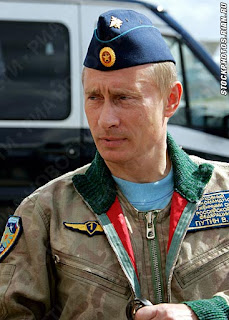Russia on top in rhythmic gymnastics with legendary coach Irina Viner-Usmanova
by Olivia Kroth

The last four Olympic Games have demonstrated Russia’s superiority in rhythmic gymnastics. Since 2000, Russian gymnasts have stood at the top of the podium in both individual and team competitions, winning eight golds, two silvers and one bronze, adding up to 11 medals out of a possible 12. Now the Russian Federation is preparing to maintain its hegemony at the Rio 2016 Games in Brazil, as the site http://www.rio2016.com informs. Much of this fame is due to the team coach, legendary Irina Viner-Usmanova, who was decorated with the medal «Hero of Labour», on the 1st of May 2015. Irina Viner-Osmanova has been Russia’s team coach since 1992 and president of the Russian Gymnastics Federation since 2008. She has helped deliver eight Olympic medals and more than 70 world championship golds for her country.

Russian rhythmic gymnastics coach Irina Viner-Usmanova
Russia’s energy giant Gazprom, since 2002 the primary sponsor of the All-Russian Federation of Rhythmic Gymnastics, informs on its website: «In Russia rhythmic gymnastics is an object of national pride. Russian female rhythmic gymnasts have been traditionally considered one of the most prominent athletes in World Championships and Olympic Games. The term ‘rhythmic gymnastics’ in the Russian language was devised in the Higher School of Aesthetic Movement, which opened the P.Lesgraft Leningrad State Institute of Physical Culture, in 1934. The first Rhythmic Gymnastics World Championship was held in Budapest, in 1963. Rhythmic Gymnastics made a debut in the Olympics programme of 1984. The present-day competitions of female rhythmic gymnasts are primarily all-around events, comprising four optional routines with apparatus selected every season out of five alternatives: ball, clubs, hoop, ribbon and rope.»
http://www.gazprom.com/social/supporting-sports/gymnastics/
Female gymnasts in Russia start training at a very young age. Top rhythmic gymnasts show balance, coordination, flexibility, self-discipline and strength as the most important qualities in this sport. They must also possess the ability of competing under intense pressure. Furthermore, they should be willing to practice the same skills repeatedly. Soviet champions were Elena Karpuchina, Galina Shugurova, Irina Deriugina and Marina Lobatch, who became the first Soviet woman to win the Olympic Games, in 1988. After 1991, the Russian Federation has been the dominant country in rhythmic gymnastics. In 2000, Yulia Barsukova won the Olympic gold medal. This victory was repeated at the Olympic Games of 2004 by Alina Kabaeva. Evgeniya Kanaeva won Olympic gold twice, in 2008 and 2012. As a team the Russians brought home Olympic gold in 2000, 2004, 2008 and 2012.
Evgeniya Kanaeva performs with clubs:

Irina Alexandrovna Viner-Usmanova was born in Samarkand, Uzbek SSR of the Soviet Union, on the 30th of July 1948. She began training gymnastics at the age of 11 and became a three-time gymnastics champion of the Uzbek SSR. Later, she graduated from the Uzbek State Institute of Physical Culture. Irina Viner worked in Tashkent as coach of the Uzbek national team in rhythmic gymnastics before moving to Moscow, where she became head coach of the Russian national team, in 1992. That same year she married Alisher Usmanov, also a native of Samarkand. Alisher Usmanov is one of the richest business magnates in Russia today. He is a Moslem, Irina Viner is Jewish. Their marriage is the best example for happy interreligious marriages in the multi-religious Russian Federation. Irina Viner-Usmanova does not know Hebrew but practices Kabbalah. In 2007, she received the «Living Legend» prize by the Federation of Jewish Communities in Russia.
Alisher Usmanov with his wife Irina Viner-Usmanova:

While her husband became a successful businessman, Irina Viner-Usmanova acquired fame as a trainer of champions. The list of her girls who made it to the top is long. She knows that working together, sharing experiences and love for the sport as well as creativity are the main factors for being on top: «Each gymnast is different and it’s very interesting to be able to develop them based on their natural talent. We never think about medals. We love to work with creativity, soul and interesting ideas.” The girls are full of praise for their coach. “Irina is a genius. Global rhythmic gymnastics wouldn’t be at such a high level, with so many achievements, if it wasn’t for her contribution,” said Rita Mamun, one of the girls who belong to the youngest generation of Russian medal winners.
What makes Irina Viner-Usmanova’s coaching so successful? «Inner strength, energy and belief in the students,» according to herself. In an interview with the Russian magazine HELLO Irina Viner-Usmanova gave some insights into her life and work. «God gives strength», she believes. She is very strict with the young girls, watches over their diet and weight. Overweight is bad for the athletes’ health. Even three kilos overweight can be dangerous. Irina Viner-Usmanova knows: «You can injure the leg. Imagine, when you jump the body load on it will increase by three times. Injury will come because of it.» She also gives advice about what to eat: «It is necessary to eat small portions five times a day so that the stomach will not be stretched. If there is no time to eat, take some snacks with you to the hall, such as dried apricots, prunes, raisins.» The teenagers, of course, would like to spend some nights at the disco, but this is not compatible with the strict training plan. «If you do not succeed, I will send you back to your mother!» That is the worst threat Irina Viner-Usmanova will ever utter. She is very protective of her young team, even tries to find good husbands for the girls. «I ensure them a decent life. I give a dowry to all of these children. They are smart, hard-working, all of them beauties. They deserve a good husband.»

In 2013, Irina Viner-Usmanova’s dream came true. The new Olympic Village training centre at Novogorsk was opened. Situated in the Khimki district, a beautiful suburb of Moscow, the Novogorsk centre is a unique architectural object. It can accept about 250 sportsmen, coaches and doctors of national teams simultaneously. The centre offers facilities for living and training of sportsmen of 32 different sports, including basketball, volleyball, figure skating and rhythmic gymnastics (individual and groups). Irina Viner-Usmanova said in an interview, «I have long had a dream to start an educational and sports cluster, which includes a kindergarten, a school, a swimming pool, a health centre, a sports complex and a hotel. I have long voiced it at various meetings, including the Council of the Presidency. Once upon a time in the Soviet Union, we had boarding schools but the forms in which they existed in the past do not work today. A modern version is needed.» This modern version now operates in Novogorsk. On the territory of the Novogorsk centre there are two sports and rehabilitation complexes, an administrative building, football fields and parking areas. Sportsmen are welcomed and served by hospitable staff members, and all the facilities they need are provided for them to achieve the best possible results in their sports.
Sports and residential complex Novogorsk:

Olivia Kroth: The journalist and author of four books lives in Moscow.
Her blog:
















_REFON.jpg/270px-Ip%C3%AA_(Avar%C3%A9)_REFON.jpg)


Thanks for liking my comment, on Dolly’s blog. I wanted to visit you. 🙂 You have a great blog, congratulations.
Me gustaLe gusta a 1 persona
Thank you for the visit and kind words, purpleslob. By the way, I left a comment on Dolly’s blog too but it has not appeared yet. Maybe it landed in spam? It was a comment in Russian. I believe that the Russian language is not welcome in the USA, unfortunately. What a pity. It is a beautiful language.
Me gustaLe gusta a 2 personas
Oh no, I hope it gets published. Russian is beautiful. You’re right, tho about it not being much appreciated. 😦
Me gustaLe gusta a 1 persona
No, Dolly has not published my comment yet, nor has she published another Russian comment I gave her on another of her excellent articles. It is a shame, she probably is afraid she will get persecuted, over there, in your country, where the powers that be are trying to annihilate Russia.
Me gustaLe gusta a 2 personas
Yes, the government, but not we the people!
Me gustaLe gusta a 1 persona